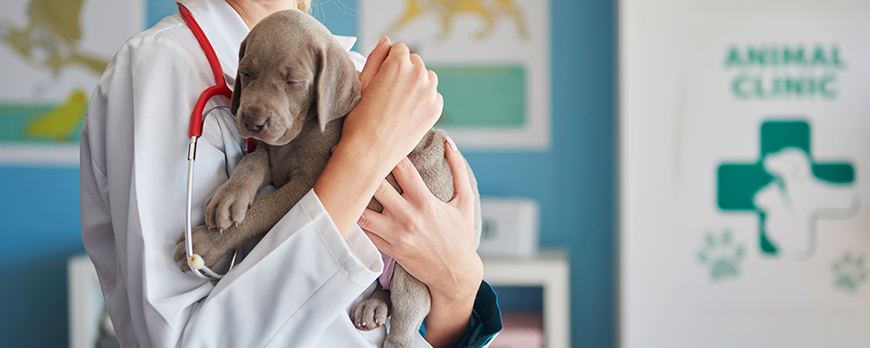10 Qualities of a Good Veterinarian

What is a good veterinarian like? Vets should have certain personality traits and abilities that are likely to make them more successful at work. Some of these are their natural characteristics, while other skills must be honed and mastered. What qualities should a good veterinarian have?
1. Compassion
Veterinary doctors are contacted by farmers, breeders, and pet owners who worry about their animals’ health. That’s why vets need to be patient and thoughtful when dealing with these people’s emotions. What’s more, they need to treat animals with respect, no matter if it’s a pet, a wild animal, or livestock.
2. Manual skills
This is another quality that a veterinary surgeon must have. These professionals often have to use strength to restrain an animal that won’t cooperate because it feels scared or angry. At the same time, when they treat or examine their patients manually, they should touch them with great delicacy and care. Vets need to be precise when performing surgical procedures as well – they must be constantly conscious of their moves and where they place their hands.
3. Communication skills
Every vet should be able to easily guide and instruct their crew as well as their colleagues and the administrative staff. They should also know how to talk to animal owners to explain the patient’s condition and how to take care of it. Their instructions must be clear and concise, expressed in a comprehensible way.
4. Problem-solving skills
To correctly diagnose an animal, veterinarians sometimes need to follow physical examination with medical imaging and lab tests. An animal won’t tell the vet where it hurts, and the owners can only describe the perceptible differences in behaviour. This is why veterinary doctors should be well qualified to identify and diagnose symptoms, behavioural changes, and other concerning aspects.
5. Decision-making skills
Sometimes, vets must treat animals that are in critical condition – wounded or seriously ill. They need to make quick decisions about what to do next, based on available information. In the case of many routine injuries and diseases, they virtually have to make up their mind at once to treat the animal properly. Vets are also often questioned about their decisions by animal owners, especially in terms of the treatment plan or method.
6. Openness to learn
Let’s face it: being a veterinarian requires a lot of effort. Vets spend hours learning at various educational institutions and beyond. The scope of knowledge they have to acquire is vast. Besides, even the most experienced doctors should update their medical knowledge from time to time. Veterinary surgeons are usually also specialists in dermatology, immunology, anatomy, physiology, and many other fields.
7. Stress management
This is another crucial skill for every veterinarian. Anyone who wants to be a vet should be prepared for the unpredictable: in this profession, you have to quickly react to difficult situations. Sometimes, you may need to use unconventional methods. Vets cannot get carried away with emotions and stress. They should keep it cool – and be ready to make tough decisions, such as euthanising a patient.
8. Appropriate approach to animals
Difficult patients visit veterinarians regularly – that’s why it’s so useful to know how to tame animals to win them over. This is necessary to diagnose them. Veterinary doctors should understand animals’ needs to an extent that allows their patients to feel comfortable in the surgery and reduces stress as much as possible. Vets must love animals – just like paediatricians should love children. Composure and a positive mindset are a must in this profession.
9. Good organisation skills
If you want to run your own veterinary practice, you need good time and task management, planning, and scheduling skills. Efficient organisation is required in many professions, including doctors. Good organisation makes diagnosing quicker and helps animals feel better.
10. Advanced technical skills
If you’re employed in a hospital or veterinary clinic, you need to know how to handle diagnostic medical devices. Advanced technical equipment guarantees precision in the care of sick and injured animals. To be a good vet, you need not only the right theoretical knowledge and experience but also the ability to use state-of-the-art technology. You should keep up to date with the latest solutions in the field of animal diagnostics and treatment. If you have your own veterinary office, you should also know how to use the necessary software and prepare and archive the required medical documentation.
Proper veterinary clothing
Professional image matters – not only for veterinarians but also for other healthcare specialists. Make sure to equip yourself with top-quality medical uniforms. Our online store offers a wide choice of clothes adjusted to individual needs: veterinary lab coats, scrub sets, scrub tops, medical shoes, and many other products.

How to be a good vet – passion and responsibility
To be a good vet, you need both the right know-how and soft skills. You should combine your love for animals with a professional and objective approach to work. Good decision-making skills, precision, and empathy are some of the qualities that are indispensable if you want to be a veterinary professional.
See our scrubs https://www.uniformshop.eu/medical-scrubs-veterinary-clothing
